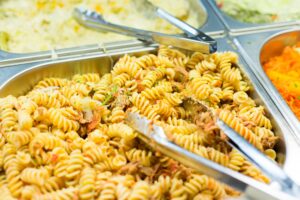9 Buffet Foods You Should Skip (and Why)

Buffets are a popular dining choice for those looking for variety and value. From lavish spreads in hotels to the local all-you-can-eat joints, the allure of endless options can be irresistible. However, not all buffet foods are created equal. Avoiding some dishes for health, taste, and overall value is best. Here’s a guide to the buffet foods you might want to skip during your next visit.
1. Creamy Salads: A Hidden Calorie Bomb

Starting off the buffet with a plateful of creamy salads—think potato, coleslaw, or macaroni—might seem harmless, but these often include large amounts of mayonnaise and other high-calorie ingredients. A single serving can contain more than half your daily recommended fat intake. The high calorie count isn’t the only issue; these salads are also typically low in nutrients, making them a poor choice compared to fresher, greener options.
2. Fried Foods: Crispy but Costly to Your Health

Fried foods are a staple at many buffets, but they are among the least healthy choices. Items like fried chicken, tempura, or spring rolls are high in trans fats and calories, contributing to heart disease and weight gain. Plus, these foods often sit out for extended periods, leading to a decrease in quality and an increase in oil absorption, making them even more unhealthy.
3. Processed Meats: Sodium and Preservative Overload

Cold cuts and other processed meats are common in buffet spreads. While they provide easy-to-eat options, they are heavy in sodium and preservatives like nitrates, which are linked to various health issues, including increased risk of cancer. Opting for freshly carved meats can be a healthier alternative that doesn’t sacrifice flavor.
4. Pre-made Pasta Dishes: Heavy and Often Overcooked

Pasta dishes at buffets are typically pre-made and kept warm for an extended period, often leading to overcooked, mushy textures. Additionally, these dishes are frequently prepared with heavy, creamy sauces that can feel overly filling and derail dietary goals. Choosing lighter, freshly made options, or even a simple drizzle of olive oil with herbs, can be a tastier, healthier way to enjoy pasta.
5. Excessive Sushi: Questionable Freshness and Quality

Sushi at buffets can be risky due to concerns about the freshness of the seafood. Buffet sushi is often made in large batches and can sit out beyond the recommended time limits, potentially leading to food safety issues. It’s also usually simpler rolls filled with surimi or vegetables, which are less satisfying than freshly made sushi from a dedicated restaurant.
6. Desserts: Sugar-Filled Temptations

Buffet desserts like cakes, pies, and pastries are tempting but generally packed with sugars and unhealthy fats. Overindulging in these sweet treats can lead to a spike in blood sugar, followed by a rapid crash, which might leave you feeling tired and unsatisfied. If you desire something sweet, look for fruit or smaller portions of desserts that offer a taste without the calorie overload.
7. Canned Vegetables: Lacking in Flavor and Nutrients

While fresh vegetables are a great addition to any meal, but their canned counterparts, often found in buffets, lack many benefits. Canned vegetables can have diminished nutrient levels and are typically loaded with added sodium to enhance shelf-life and taste. Freshly steamed or raw vegetables provide better flavor and more health benefits.
8. Pre-made Seafood Dishes: A Breeding Ground for Bacteria

Seafood needs to be handled and cooked correctly to prevent foodborne illnesses, and buffet settings often fall short. Dishes like seafood salads or pre-made fish entrees can be breeding grounds for bacteria if not kept at the proper temperature. Opting for freshly cooked seafood dishes can reduce the risk of consuming spoiled food.
9. Mystery Stews and Casseroles: Unidentified Ingredients, Unwanted Calories

Often made from leftovers or a mix of ingredients nearing their expiration, stews and casseroles at buffets can be calorie-dense and filled with fat. They may also include ingredients that cause dietary intolerances, such as gluten or dairy, hidden amidst the mix. Opting for dishes where you can identify all the components allows better dietary control.
Make Smart Choices When Eating Buffet Foods

Buffets offer a fantastic variety of dishes, but not every option is worth your plate space. By choosing wisely and avoiding certain foods, you can enjoy a healthier, more satisfying meal without the post-buffet regret. Next time you’re at a buffet, remember that the quality of your choices matters just as much as the quantity. This approach not only ensures a better dining experience but also aligns with a healthier lifestyle.
Read More:
11 Garden Vegetables You Can Cook in an Air Fryer
Health Myths Busted: 12 Things You Thought Were Bad for You but Aren’t